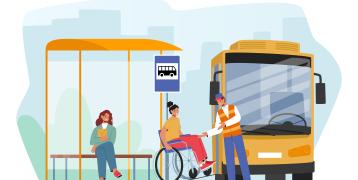About the organisation
Turku UAS has participated in 3 Interreg Europe projects (2014-2020):
CLIPPER: Creating a leadership for maritime industries - New opportunities in Europe (partner)
eBUSSED: Building capacities for European-wide e-bus deployment (LP)
REDUCES: REthinking Sustainable Development in European Regions by Using Circular Economy Business ModelS (LP)
Project ideas
1 projects ideas
Green
INCLUDES - Promoting just and inclusive mobility policies in European regions
Feedback received
Turku University of Applied Sciences

Finland
Zero-carbon urban mobility
05 Mar 2024
By
Annika
Kunnasvirta
Project contributions
3 projects
Organisation members
20 members
Project manager
Turku University of Applied Sciences

Finland
Interested in
4 projects

team leader, project manager
Turku University of Applied Sciences

Finland
Interested in
Turku University of Applied Sciences

Finland
Interested in
Senior Advisor
Turku University of Applied Sciences

Finland
1 project
Senior advisor
Turku University of Applied Sciences

Finland
Interested in
2 projects
Project Advisor
Turku University of Applied Sciences

Finland
2 projects
Project Manager
Turku University of Applied Sciences

Finland
Interested in
1 project
Project coordinator
Turku University of Applied Sciences

Finland
Interested in

Turku University of Applied Sciences

Finland
Interested in

Research group leader
Turku University of Applied Sciences

Finland
Interested in
Turku University of Applied Sciences

Finland
Student
Turku University of Applied Sciences

Finland

Senior Lecturer
Turku University of Applied Sciences

Finland
Interested in
Project advisor
Turku University of Applied Sciences

Finland
Interested in
Head of Community and Collaboration
Turku University of Applied Sciences

Finland
Interested in
Senior advisor
Turku University of Applied Sciences

Finland
Interested in
Turku University of Applied Sciences

Finland
Project manager
Turku University of Applied Sciences

Finland
Interested in
1 project
Financial secretary for projects
Turku University of Applied Sciences

Finland
1 project
Researcher
Turku University of Applied Sciences

Finland
1 project
Topic interests
Member's expertise
You might want to connect with
10770 organisation(s)
Fakultet hrvatskih studija Sveučilišta u Zagrebu

Croatia
Grad Zagreb
Education and research institution
Members are interested in
Bundesministerium Innovation, Mobilität und Infrastruktur (BMIMI)

Austria
Wien
National public authority
Members are interested in
Универзитет Мајка Тереза Скопје

Republic of North Macedonia
Education and research institution
Members are interested in







